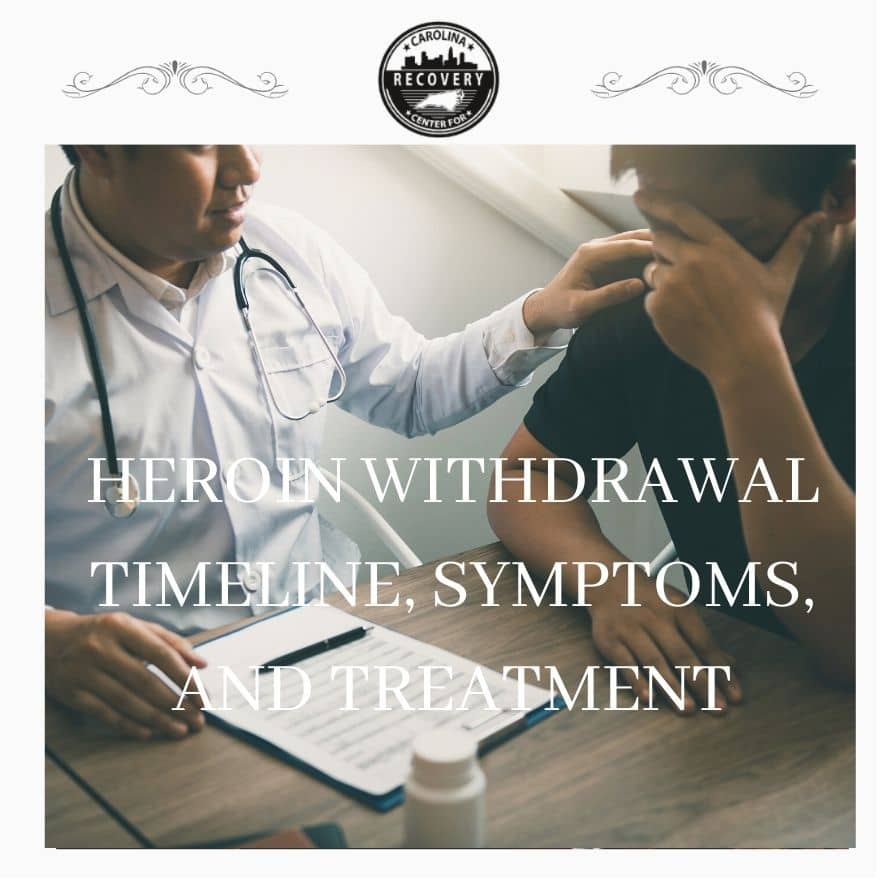Heroin Withdrawal Timeline, Symptoms, and Treatment

Medically Verified: 2/1/24
Medical Reviewer
Chief Editor

All of the information on this page has been reviewed and verified by a certified addiction professional.
Heroin is a potent opioid drug that can be smoked, injected, or snorted. People who use heroin for even a short time are at increased risk of developing an addiction that requires treatment. While heroin addiction can be severe and difficult to overcome, recovery is possible if the person receives comprehensive treatment and support.
For most with heroin addiction, detox is the first step of treatment. A medically-supervised detox program allows people the support they need as their body rids itself of toxins. During the detox stage, many people who use heroin experience uncomfortable withdrawal symptoms. After detox, people must continue a treatment program that offers the support they need to stay committed to lifelong sobriety.
Understanding what happens during each stage of the heroin withdrawal timeline can help prepare you for what lies ahead and make informed choices about your care.
Understanding the Heroin Withdrawal Timeline
Throughout heroin abuse, your body adapts to the presence of heroin in your system. Withdrawal occurs when the drug is no longer present in your body. Withdrawal symptoms can be very uncomfortable or sometimes dangerous. The severity of your addiction, your mental health, and other factors can affect the length and severity of your withdrawal symptoms.
Generally, people experience symptoms on the following timeline:
- 6-24 Hours: Physical symptoms begin. They include muscle pain, tremors, insomnia, anxiety, and strong cravings for heroin.
- 1-3 Days: Physical symptoms may worsen and peak during this time. People may also experience nausea and vomiting.
- 4-7 Days: Physical symptoms often decrease toward the end of the first week. Psychological symptoms like depression, anxiety, and insomnia remain.
- 1 week-3 months: Many still struggle with insomnia, depression, and anxiety for several months, and cravings may still occur.
Because withdrawal from heroin can be uncomfortable and cravings are intense, detoxing entirely from heroin on your own is tough. The majority of people who attempt to stop using heroin on their own are unsuccessful. Going through withdrawal under medical supervision is the best way to ensure you have a safe, complete detox from heroin.
Symptoms of Heroin Withdrawal
The symptoms people experience, and their severity depends heavily on how often the person used heroin, how much they used, and how long they used it. Generally, heroin withdrawal symptoms include:
- Chills
- Sweating
- Shakiness
- Body aches
- Muscle spasms
- Stomach pain and cramping
- Increased heart rate
- Anxiety
- Depression
- Disrupted sleep
- Impaired breathing
- Nausea and vomiting
- Fatigue
- Cravings
These symptoms may come and go throughout the heroin withdrawal timeline.
Using heroin after a period of abstinence can be dangerous or life-threatening. People must seek medical supervision during withdrawal from heroin to have a complete detox from the drug and avoid early relapse.
How Long Does Heroin Withdrawal Last?
Heroin withdrawal can vary in length, depending on various factors. Generally, people experience acute withdrawal symptoms starting within a few hours to a day since last using heroin. Acute symptoms can last for about a week, but some experience lingering symptoms for months after stopping.
Several factors can impact the length and severity of a person’s heroin withdrawal symptoms. These include:
- The length of time they used heroin
- How they ingested the drug
- How much heroin they used each time
- Prior opioid withdrawal
- Mental illness
People with shorter histories of heroin use are likely to have shorter, less intense periods of withdrawal than those who use heavily for longer.
Rarely, someone may experience a complication of heroin withdrawal called Post Acute Withdrawal Syndrome (PAWS). While it is uncommon, PAWS can cause a person to experience withdrawal symptoms like cravings, irritability, insomnia, and depression or anxiety, for months or years. Those who develop PAWS are at increased risk of relapse and often require ongoing support and treatment to manage the condition.
What Happens During Heroin Addiction Treatment?
Because everyone’s addiction is different, treatment staff tailor treatment plans to address each person’s unique needs and goals. However, addiction treatment usually happens in three stages.
Detox
You will receive medical supervision and treatment for your withdrawal symptoms during detox. You will have distance from your triggers, including drugs, when you are at the highest risk of relapse. To ensure a safe, complete detox, you will likely stay in detox for the entire duration of acute heroin withdrawal.
Treatment
After detox, you will work through a treatment program that consists of a combination of evidence-based therapies. Your treatment team will design your program to support your physical and mental health and give you the skills to overcome your addiction for life. This may include:
- Medications
- Mental health care
- Group therapy
- Education
- Holistic therapies
- Individual counseling
- Family therapy
The amount of time you spend in treatment will depend on the length and severity of your addiction.
Aftercare
Because addiction is never truly cured, you will need to develop a plan to manage the condition for the rest of your life. Heroin rehab aftercare may involve:
- Attending group support or 12-step meetings
- Joining an alumni group
- Participating in individual therapy
- Continuing or starting holistic treatments and therapies to support overall wellness
You must find meaningful ways to stay active and engaged in your recovery to remain committed to sobriety for life.
Find Help Now
If you or someone you love require heroin addiction treatment or support during recovery, reach out to the Carolina Center for Recovery specialists today. We can help you detox safely and comfortably, then guide you through your recovery journey. Call now to get started.

